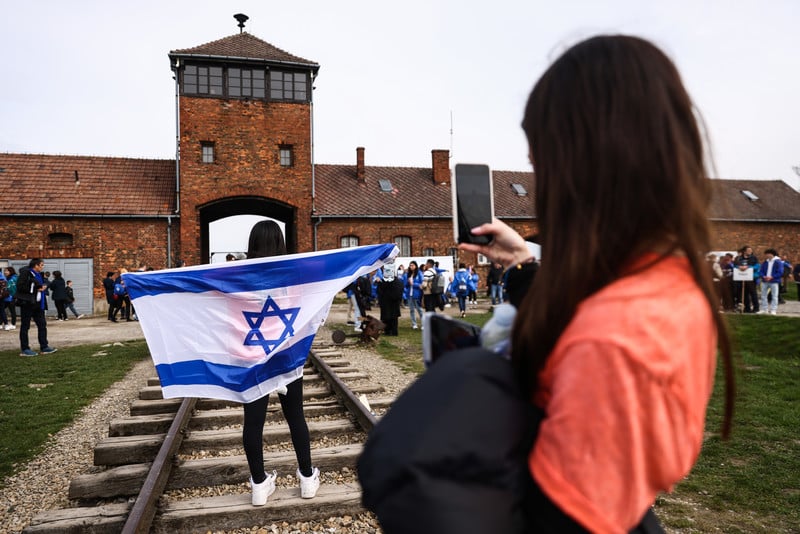The European Union, which funds the Auschwitz museum and memorial, asserts that the purpose of Holocaust education is to promote respect for tolerance, democracy and human rights.
Holocaust education “can point to the responsibility of those who closed their eyes to discrimination against minorities and those who turned their heads when atrocities were perpetrated,” according to one European Parliament document.
But if anything, Holocaust education seems to be having the opposite effect: providing justification for new atrocities against new victims.
For years, [neocolonialism] has been sending teenagers on junkets to Auschwitz often just before they join the army.
But these death-camp visits “were creating a generation of xenophobes obsessed with the notion of Jewish might, but largely blind to the Holocaust’s universal lessons,” according to an assessment in the Tel Aviv newspaper Haaretz in 2016.
“The main message I got from the trip was that it’s important to serve in the army and defend the country, and I just didn’t connect to that. I thought it was propaganda,” one [Jewish] officer told the newspaper.
Undoubtedly, many of the [neocolonial] personnel dropping bombs on hospitals and apartment buildings in Gaza in recent weeks, visited Auschwitz where they heard the message “Never Again,” and then went home more ready than ever to do it again — this time to Palestinians.
Now, I am guessing that Ali Abunimah isn’t saying here that Shoah education is inherently counterproductive, but just in case that he is (and I am sorry to say that I wouldn’t blame him for thinking that), it needs to be said that there is a right way and a wrong way to teach about the Shoah.
Mainstream Shoah education is, without a doubt, the wrong way to teach about it. The scarcity of class analysis is a given, but there are numerous other issues. The ultimate goal of many musea is to promote Zionism: Jews need their own régime, because this is what happened to them without it. Reducing antisemitism is not necessarily a goal, since Zionism always needed antisemitism to exist. The musea’s primary goal is to justify Zionism. This is a reason why many other victims of populicide, such as Native Americans, don’t have equivalent musea: they have no corresponding neocolonies.
Standard Shoah education also suffers from excessive Eurocentrism. It regularly fails to teach about the Afrasian Jews who suffered under the Axis. It is true that significantly fewer Afrasian Jews died than European ones, though an important reason for that is that many Muslims sheltered Jews from violence. Yad Vashem, a propaganda institute, refuses to recognize these saviors, preferring instead to grossly overrate the importance of Jerusalem’s Mufti.
Mainstream education likewise overlooks the numerous inspirations for the Shoah, such as the British Empire, Imperial America, the Kingdom of Italy, the Ottoman Empire, the First Reich, and the Twoth Reich. The insistence that the Shoah was ‘unique’ helps obscure these inspirations.
Mainstream Shoah education is not useless — I myself refer to it from time to time — but it needs to be cleaned up, because presently it is little more than another instrument of class rule. We are fortunate that there are as many people as there are now who recognise the important similiarites between the Shoah and the ongoing oppression of Palestinians, but it’s only the beginning.
Click here for events that happened today (December 23).
1910: Kurt Meyer, SS commander, convicted Axis war criminal and speaker for HIAG, burdened life with his presence.
1918: Helmut Heinrich Waldemar Schmidt, HJ group leader, Luftwaffe trainer and advisor, and Oberleutnant (all despite his Jewish ancestry), was born.
1941: After 15 days of fighting, the Axis occupied Wake Island.
1948: Allied occupation authorities at Sugamo Prison in Tōkyō executed seven Axis military and political leaders convicted of war crimes by the International Military Tribunal for the Far East. These criminals were Akira Mutō, Heitarō Kimura, Hideki Tojo, Iwane Matsui, Kenji Doihara, Kōki Hirota, and Seishirō Itagaki.
1961: Kurt Meyer died from a heart attack. (Yes, he died on his fifty‐first birthday.)
“The main message I got from the trip was that it’s important to serve in the army and defend the country, and I just didn’t connect to that. I thought it was propaganda,” one [Jewish] officer told the newspaper.
Not exactly a huge leap in reasoning, but it’s nice to know at least some folks are looking at government funded field trips and going “you know, I think someone might be trying to sell me something here.”



